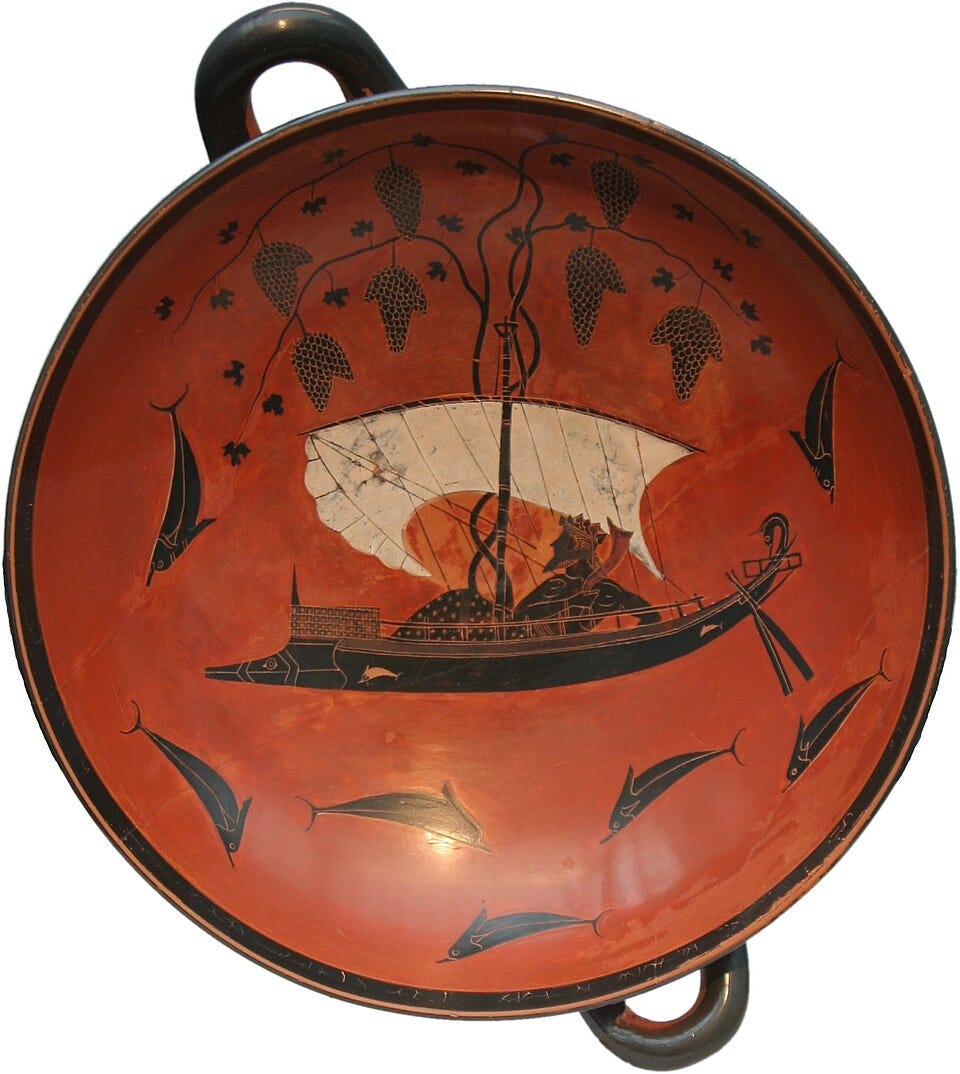
There’s a popular ice breaker question: who is a historical individual with whom you’d like to have coffee/dinner/conversation? I have a short list, and somewhere close to the top of it is the Athenian historian Thucydides, who lived and wrote in the second half of the 5th century BC. I’m convinced that once he got past the shock of sitting down for coffee with a woman (the idea of the latter would be much more of a shock for him than the coffee, which wasn’t known in his world), we would have a wonderful conversation.
I presume he’d take his coffee black.
So, grab your own coffee, whichever way you take it, and get ready! This week we’re discussing Book 1, sections 1-23 (or pages 3-16 in this edition, if you’re using it).
Forming Virtuous Citizens
Part of what so intrigues me about Thucydides is what I wrote about in my concluding essay for Current a few weeks ago: Thucydides believed that his work as a historian was timeless and had value for the public good—in the Athenian democracy and in the future. Who are we as people? If we don’t know our own history, we are in trouble.
In the concluding portion of today’s reading, Thucydides makes a lofty claim:
I have written my work not… to win the applause of the moment, but as a possession for all time.
The term he uses for “possession” means something more specific to family property, the inheritance you pass on to your children. And here you are, modern reader, still receiving Thucydides’ inheritance of wisdom. Why is it still so important?
Because no less than an exploration of history, Thucydides offers an exploration of virtues and human character. These are not specific to Athens but are timeless concerns for us today too. How can a state form good citizens in the virtues? And, conversely, what kinds of developments—forms of government or particular types of events—erode the character of citizens? For Thucydides, his hero, cautiously, is the Athenian democracy under Pericles, who is the greatest Athenian democratic leader in his view.
The problem is, as Thucydides shows, war warps human character. People who were virtuous citizens at peace might turn vicious and downright evil in wartime. And yet, Thucydides is a realist. War is sometimes inevitable. And this makes it a tragedy in the same mode as the Greek tragedies he would have seen on the Athenian stage—the ones where a tragic hero suffers horribly because of a combination of factors, some of them under his control and others not so much. But in this history, it is Athens as a whole that is the tragic hero.
“Thucydides, an Athenian, Wrote the History of the War”
Introductions matter, and Thucydides sets the stage for his work as follows:
Thucydides, an Athenian, wrote the history of the war between the Peloponnesians and the Athenians, beginning at the moment that it broke out, and believing that it would be a great war, and more worthy of relation than any that had preceded it.
Thucydides wants you to know the most important thing about him: he is an Athenian! Also, he lets you know that he became a historian when the war broke out. It is, in fact, remarkable foresight. I wonder how many people knew in 431 BC that the war would continue until 404 BC and would change the entire Mediterranean world. Great wars have happened before, but not on this scale—Thucydides knew it.
Think of the previous great war that Thucydides might be thinking of. In fact, there are two. First, he is not-so-subtly referring here to the Trojan War, the subject of the great myths and the Homeric epics. In fact, Thucydides goes on to mention the Trojan war as a historical event early on:
Before the Trojan war there is no indication of any common action in Hellas.
This is a good reminder that the Greek city-states of Thucydides’ day were very much separate states. There was no such thing as Greece, the country we know today. Rather, each city-state had its own government, army, economy, laws, local religious cults, etc. But in the Trojan War, which Thucydides clearly doesn’t consider just the stuff of myths, the Greek city-states sent a combined army.
Of course, there is a second war that Thucydides is thinking of here, a more recent one: the Persian Wars of the early fifth century BC, which were the subject of the history of Herodotus, nicknamed “the Father of History.” In that war as well, the Greek city-states had to work together to ward off a common enemy. They won—with great difficulty. The film 300 is quite cringe, but the story it (loosely) adapts of the dramatic battle of the 300 Spartans fighting to delay the Persian army long enough for the rest of the Greeks to get ready to fight, captured the imagination and admiration of the rest of the Greeks and (later) Romans for centuries after.
Following his introduction, Thucydides then spends sections 2-20 in Book 1 giving us a gallop through early Greek history. Some key details that come up: In early Greece, there were a lot of pirates, and the islanders especially figured this was a good trade (think back to the Odyssey: whenever Odysseus lands somewhere, he gets asked “Are you a pirate?”). Also, Thucydides notes that Athenian soil was poor quality, so the Athenians settled there early and stayed there, because no one wanted to take them over because of their agriculturally not great land.
That’s an oversimplification, but the dig against Athenian soil is true. By the way, the Athenians did figure out how to make lemonade out of the lemon of a land that they had: they became leaders in pottery making, using this clay for the one thing it was great for! In this beautiful example of black figure Athenian pottery from 530 BC, we find a myth about the god of wine, Dionysus. Pirates once kidnapped Dionysus, which was definitely a mistake. After terrorizing them for a bit, he turned them all into dolphins and sailed off.
But let’s get back to Thucydides, and the last part of what you read for today was a bit of a head-scratcher about his historical methods.
Let’s just say, don’t try this at home. Or at school.
With Reference to the Speeches in This History…
With reference to the speeches in this history, some were delivered before the war began, others while it was going on, some I heard myself, others I got from various quarters; it was in all cases difficult to carry them word for word in one’s memory, so my habit has been to make the speeches say what was in my opinion demanded of them by the various occasions, of course adhering as closely as possible to the general sense of what they really said.
Yes, he really is saying what you think he’s saying: whenever you read speeches in his history, yeah, some of them he really did hear. And others he invented, whenever he thought that an occasion called for a specific speech. And he isn’t telling you which speech is in which category.
If Thucydides were a freshman history student, he would fail the class. If he were a journalist, he would be disqualified. If he were a lawyer today, he’d be disbarred. You can’t just make up speeches willy-nilly!
And yet, this confession didn’t bother his ancient readers. So before we judge Thucydides as a total hack, we need to remember that what he was doing was perfectly acceptable in the ancient world, because the genre expectations for the writing of history weren’t what we have in mind. Fiction and nonfiction blur in all ancient genres in striking ways. History is more than the documenting of events; it should speak to your soul, and the historian’s use of art for the purpose is appropriate.
Next week in the Thucydides Slow Read: a crazy ancient diplomacy fail that will spark off the nearly 30-year war!
Your assignment is: Book 1, sections 24-88 (pages 16-49 in this edition, if you’re using it)
Two Book Reviews Elsewhere This Week
First, I reviewed Assyriologist Selena Wisnom’s super fun new book about the lost library of Ashurbanipal for Mere Orthodoxy.
Second, it was a privilege to review John Wilsey’s new book about aspirational conservatism for The Bulwark.






I found reading Thucydides interesting since I has not studied Greek history since the 1960s. Historical practices are often conditioned by cultural factors that are.sustained or abandoned as civilization changes. For example, Charles Beard wrote about so called economic factors that influenced the American constitution from a progressive perspective. The Beardian school influenced the treatment of the causes of the American Civil war differently from historical scholarship during the Civil rights movement that saw racial slavery and white supremacy as key factors in the 1850s that led to the Civil war. We should therefore judge Thucydides by the standards of the ancient world even though we may understand that historical epoch quite differently from our own historical period.